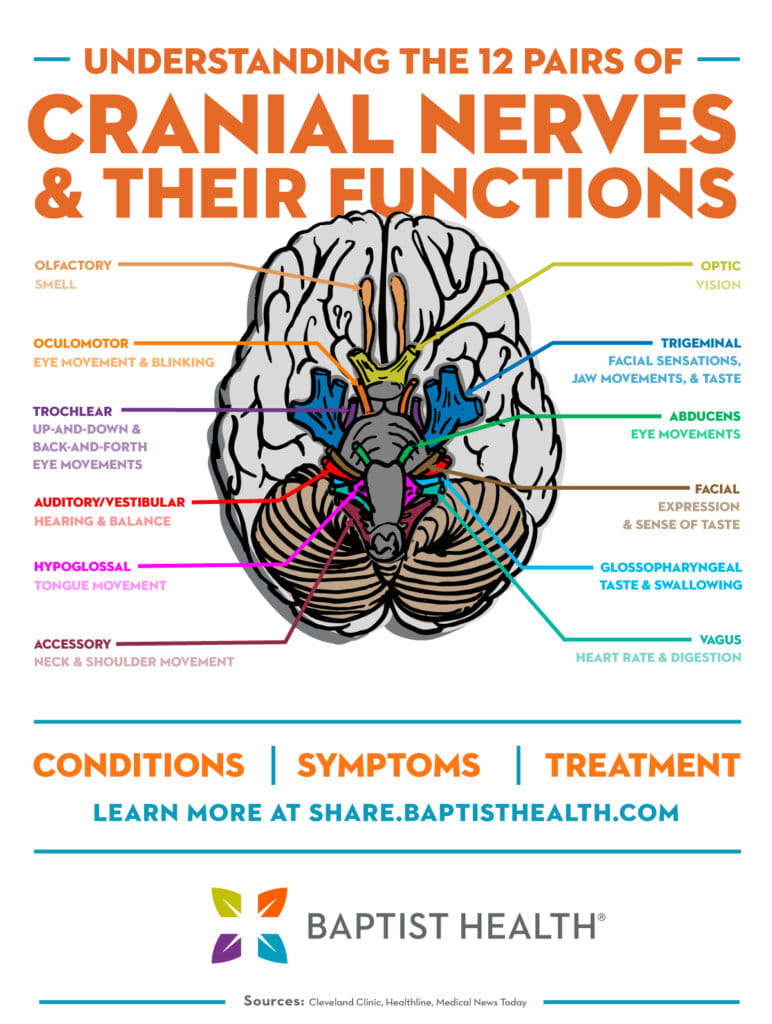Understanding Cranial Nerves and Their Functions

You have 12 sets of cranial nerves. Each is responsible for carrying information about a particular type of sensation or movement.
Where are each of the cranial nerves located, what’s their function, what are the symptoms of a damaged cranial nerve, and what can you do to keep these nerves healthy? Get answers below.
Cranial Nerve Basics
A good first question when learning about the nervous system is, “What are the four main functions of the nerves?” They’re responsible for:
- Receiving general sensory information (pain, temperature, etc.)
- Receiving specialized sensory information (including sights, sounds, taste, and smell)
- Integrating and processing information from different areas of the body
- Generating responses to stimuli
Like all nerves, the cranial nerves are thin “cables” that transmit electrical impulses throughout the body. What are the cranial nerves involved in specifically? Their signals help manage everything from intentional movements to autonomic functions like digestion and breathing.
The cranial nerves originate near the back of the brain, with one on the left side and the other on the right. Some of the sets work in similar or closely related ways. Where are each of the cranial nerves? The infographic below has details.

Cranial Nerves List: What They’re Called and What They Do
People sometimes ask, “Are the 12 cranial nerves sensory or motor?” The answer is that there are cranial nerves that serve each of those roles.
Here’s a list of the 12 pairs of cranial nerves, in order, and their functions:
- Olfactory nerves: The olfactory nerves manage the sense of smell.
- Optic nerves: These cranial nerves control vision.
- Oculomotor nerves: The oculomotor nerves manage eye movement and blinking.
- Trochlear nerves: These control up-and-down and back-and-forth eye movements.
- Trigeminal nerves: The trigeminal nerves control facial sensations and jaw movements. They also play a role in taste.
- Abducens nerves: The abducens nerves help manage eye movements.
- Facial nerves: These enable facial expression and play a role in the sense of taste.
- Auditory/vestibular nerves: Sense of hearing and balance are controlled by these cranial nerves.
- Glossopharyngeal nerves: Sense of taste and swallowing are governed by these nerves.
- Vagus nerves: The vagus nerves control heart rate and digestion.
- Accessory nerves (sometimes called spinal accessory nerves): These nerves regulate the movement of the neck and shoulder muscles.
- Hypoglossal nerves: Tongue movement is managed by these nerves.
Conditions Affecting the Cranial Nerves
Injuries and several medical conditions can affect cranial nerve functioning, including:
- Traumatic brain injuries from forceful blows to the head
- Strokes that interrupt blood flow in the brain
- Amyotrophic lateral sclerosis (ALS or Lou Gehrig’s disease) in which nerve cells break down, causing progressive muscle weakening
- Bell’s palsy that produces muscle weakness and drooping on one side of the face
- Oculomotor palsy and internuclear ophthalmoplegia that affect the movement and positioning of the eyes
- Hemifacial spasms that cause twitching of the muscles on one side of the face
- Trigeminal neuralgia that produces chronic pain in a nerve in the cheek
Cranial Nerve Problems: Symptoms and Treatment
How do you check cranial nerve function? Your doctor can diagnose problems affecting the cranial nerves. But, in general, the cranial nerves may be involved if you experience problems with any of the following:
- Vision
- Hearing
- Senses of taste or smell
- Swallowing
- Controlling facial expressions
- Balance
Injury or illness can permanently damage cranial nerves. In other cases, they may recover on their own. Some patients also benefit from rehabilitation with assistance from a medical professional such as a physical therapist, audiologist, speech pathologist, or vision therapist.
Caring for Your Cranial Nerves
The best way to support your cranial nerves and their critical functions is to manage your health in general. That includes exercising regularly, achieving and maintaining a healthy weight, eating a nutritious diet, not smoking, and managing conditions like high blood pressure and diabetes.
Talk with Your Baptist Health Physician About Cranial Nerve Problems
If you experience symptoms of a cranial nerve issue, you should contact your primary care physician. They can assess your health and, if appropriate, refer you to a specialist called a neurologist.
If you don’t have a Baptist Health physician, you can find one using our online provider directory.
Next Steps and Useful Resources:


.jpg?rev=0037cb00980a4b5ebb00750849d9cde6)
